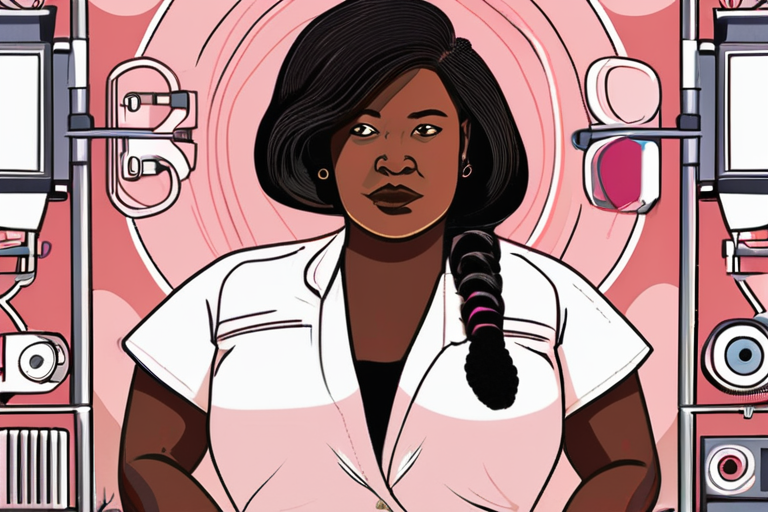One Woman's Quest to Reclaim the Ugly History of Black Maternal Health
MONTGOMERY, Ala. - Michelle Browder, a local artist-activist, has been on a mission to expose the dark history of Black maternal health in Montgomery, Alabama. Through her human-rights tours, she aims to educate visitors about the city's past and its ongoing impact on the present.
Browder's journey began when she started giving tours around 10 years ago to help pay the bills. Riding around in a red-and-white trolley, she delved into uncomfortable historical truths that many people either didn't know about or preferred to ignore. She spoke about antebellum Montgomery, one of the busiest slave markets in the South, and Confederacy-era Montgomery, where delegates from slave-owning states convened to declare their unity against the Union.
One of the city's lesser-known landmarks was a 12-foot bronze statue on the state capital grounds depicting a benign-looking man in a 19th-century frock coat, leaning on a cane. He was James Marion Sims, a physician who conducted inhumane experiments on enslaved Black women without their consent. Browder pointed out that Sims' actions were not only morally reprehensible but also had long-lasting consequences for Black maternal health.
"We have to acknowledge the past and its impact on our present," Browder said in an interview. "The legacy of slavery, segregation, and systemic racism has led to a disproportionate number of Black women dying during childbirth or experiencing complications."
Browder's tours often focus on the city's history of medical experimentation on enslaved people, including Sims' work on vesicovaginal fistulas, a condition that occurs when there is an abnormal connection between the bladder and vagina. According to Browder, this practice was not only inhumane but also had long-lasting consequences for Black maternal health.
"The fact that we're still dealing with these issues today is a testament to the ongoing impact of systemic racism," said Dr. Camara Phyllis Jones, a professor at Morehouse School of Medicine and expert on reproductive justice. "We need to acknowledge the historical context and work towards addressing the root causes of these disparities."
Browder's efforts have sparked conversations about the city's history and its ongoing impact on Black maternal health. Her tours have also inspired others to take action, including local activists who are working to establish a memorial for the enslaved women who were subjected to medical experimentation.
As Browder continues her work, she remains committed to educating visitors about the city's past and its ongoing impact on the present. "We need to confront the ugly history of Black maternal health head-on," she said. "Only then can we begin to heal and move forward."
Background:
The United States has one of the highest rates of maternal mortality in the developed world, with Black women being three to four times more likely to die during childbirth than white women.
Medical experimentation on enslaved people was a common practice in the 19th century, with many physicians conducting inhumane experiments without consent.
The legacy of slavery and segregation continues to impact Black maternal health today, with systemic racism contributing to disparities in healthcare access and outcomes.
Additional Perspectives:
Dr. Jones emphasized that addressing the root causes of these disparities requires a comprehensive approach that includes policy changes, education, and community engagement.
Local activists have expressed interest in establishing a memorial for the enslaved women who were subjected to medical experimentation, with some advocating for a more permanent solution.
Current Status and Next Developments:
Browder's tours continue to educate visitors about the city's history and its ongoing impact on Black maternal health.
Activists are working towards establishing a memorial for the enslaved women who were subjected to medical experimentation.
Local policymakers have expressed interest in addressing the root causes of these disparities, with some advocating for policy changes to improve healthcare access and outcomes for Black women.
*Reporting by Motherjones.*



 Hoppi
Hoppi

 Hoppi
Hoppi

 Hoppi
Hoppi

 Hoppi
Hoppi

 Hoppi
Hoppi

 Hoppi
Hoppi











